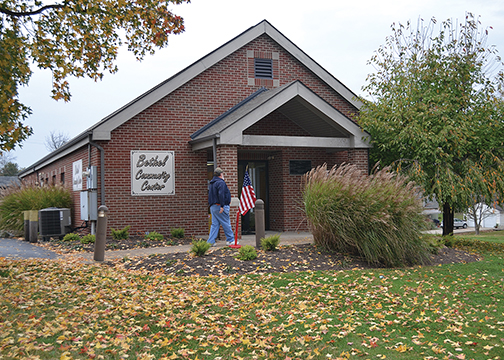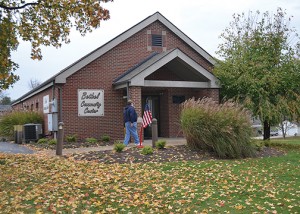

Sun staff
On Nov. 8, voters in the village of Bethel approved a ballot initiative that will repeal the village’s 0.5 percent income tax, which was adopted by council on Sept. 10, 2015.
The initiative was approved with 61.58 percent of the vote, according to unofficial results from the Clermont County Board of Elections. The final vote was 609 to 380.
The movement to repeal the tax was led by Jay Noble, Mel Dean, Joshua Schuler and John Maupin, who formed a petition committee, called the Bethel Residents Initiative Group, to get the initiative on the ballot.
“Our initiative and our purpose for this was to actually give the voters a chance to voice their opinion, so I’m glad that they were able to do that,” Noble said.
The initiative is the latest chapter in an 18-month narrative to ensure funding for the Bethel Police Department, which had to make staffing cuts when the village was placed on fiscal emergency in 2008; the department went from having seven full-time officers to three full-time, one part-time and five auxiliary officers.
In anticipation of the Jan. 31, 2015, terminus of the village’s 2.9 mill police levy, which was approved in 2010 and brought in $88,000 annually to the department, councilman James Rees brought forth a recommendation from the Finance Committee to the council to support a 1 percent income tax with no credit, however, the council voted down the tax during its meeting on April 9, 2015.
Then, on April 16, 2015, the council agreed to hold an Aug. 4, 2015, special election to put an 8 mill continuous police levy to a public vote; of the village’s then 1,667 voters, 196 participated in the special election, and the levy was defeated 125 to 71.
On Sept. 10, 2015, in what appeared to be a last ditch effort to find funding for the department, the council approved the current 0.5 percent income tax, with no credit; revenue generated by the tax goes into the village’s general fund, of which the police use 70 percent, according to Mayor Alan Ausman.
In October 2015, with funding thought to be secured, the department increased staffing and swore in three officers, which Ausman then called a, “first step in getting our police department built back up to where we need to be to get us back to 24 hour coverage, seven days a week.”
The voters’ approval of the tax repeal shows that they want more fiscal responsibility, more streamlined budgeting and more productivity, according to Noble.
“It’s not about what it’s going to do as far as the trickle effect to the budgets and so forth, I mean we understand that it’s going to take a hit to some of the financials and put a strain on some of the departments,” he said.
Ausman said he’s very disappointed by the vote because the income tax was how the village paid for the police department.
“To me, a police department is very important to a community,” he said. “A community without a police department is not a livable community.”
Ben Roa, a 6-year resident of Bethel, voted to repeal the tax.
“We pay taxes, and I don’t want higher taxes,” he said.
Likewise, Bethel resident David Taggert voted to repeal the tax, though he admitted to not really knowing why.
“I don’t know if it’s necessarily needed anymore,” he added.
Garrie Brumley, Jr., a 4-year resident of Bethel who also voted to repeal the tax, said he did so because he had no idea what the tax was for or why the council passed it.
“All of the sudden I got a bunch of letters in the mail telling me I had to pay a tax, and I knew nothing about it,” he said. “I think maybe I might have seen something somebody had printed off their computer at the gas station, but I didn’t really know what it was until I started getting billed.”
When told that the tax was passed to provide funding to the police department, Brumley asked rhetorically, “The police department; the ones that don’t do anything?”
He went on to reiterate that he “suddenly” started getting letters in the mail telling him that he had to provide information for tax purposes.
“I’m like, what in the world is this for,” he said. “And, apparently nobody else wanted it either.”
Looking ahead, Ausman said that the council will continue to review its options for paying for the police department.
“Ultimately, it’s council’s decision about which way they want to go,” Ausman added.
